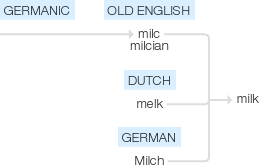Milk
Old English milc, milcian, of Germanic origin; related to Dutch melk and German Milch, from an Indo-European root shared by Latin mulgere and Greek amelgein ‘to milk’.
wiktionary
From Middle English milk, mylk, melk, mulc, from Old English meolc, meoluc(“milk”), from Proto-West Germanic *meluk, from Proto-Germanic *meluks, from Proto-Indo-European *h₂melǵ-.
From Middle English milken, from Old English melcan, from Proto-Germanic *melkaną, ultimately from Proto-Indo-European *h₂melǵ-, the same root as the noun. Compare Dutch and German melken, Danish malke, Norwegian mjølke, also Latin mulgeō(“I milk”), Ancient Greek ἀμέλγω(amélgō, “I milk”), Albanian mjel(“to milk”), Russian молоко́(molokó), Lithuanian mélžti, Tocharian A mālk-.
etymonline
milk (n.)
"opaque white fluid secreted by mammary glands of female mammals, suited to the nourishment of their young," Middle English milk, from Old English meoluc (West Saxon), milc (Anglian), from Proto-Germanic *meluk- "milk" (source also of Old Norse mjolk, Old Frisian melok, Old Saxon miluk, Dutch melk, Old High German miluh, German Milch, Gothic miluks), from *melk- "to milk," from PIE root *melg- "to wipe, to rub off," also "to stroke; to milk," in reference to the hand motion involved in milking an animal. Old Church Slavonic noun meleko (Russian moloko, Czech mleko) is considered to be adopted from Germanic.
Of milk-like plant juices or saps from c. 1200. Milk chocolate (eating chocolate made with milk solids, paler and sweeter) is recorded by 1723; milk shake was used from 1889 for a variety of concoctions, but the modern version (composed of milk, flavoring, etc., mixed by shaking) is from the 1930s. Milk tooth (1727) uses the word in its figurative sense "period of infancy," attested from 17c. To cry over spilt milk (representing anything which, once misused, cannot be recovered) is first attested 1836 in writing of Canadian humorist Thomas C. Haliburton. Milk and honey is from the Old Testament phrase describing the richness of the Promised Land (Numbers xvi.13, Old English meolc and hunie). Milk of human kindness is from "Macbeth" (1605).
milk (v.)
Old English melcan, milcian, meolcian "to press or draw milk from the breasts or udders of; give milk, suckle," from Proto-Germanic *melk- "to milk" (source also of Dutch melken, Old High German melchan, German melken), from PIE root *melg- "to rub off; to milk." Figurative sense of "exploit for profit" is by 1520s. In theater jargon, "to try to get more laughs, applause, etc. from the audience than is warranted" (1939). Related: Milked; milking.
